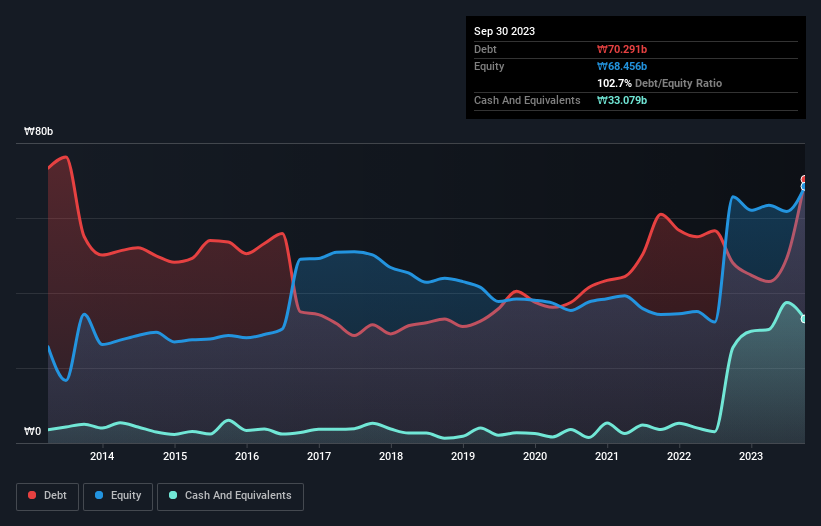David Iben put it well when he said, 'Volatility is not a risk we care about. What we care about is avoiding the permanent loss of capital.' So it might be obvious that you need to consider debt, when you think about how risky any given stock is, because too much debt can sink a company. We note that DHAUTOWARE Co., LTD (KOSDAQ:025440) does have debt on its balance sheet. But the real question is whether this debt is making the company risky.
When Is Debt Dangerous?
Debt and other liabilities become risky for a business when it cannot easily fulfill those obligations, either with free cash flow or by raising capital at an attractive price. If things get really bad, the lenders can take control of the business. However, a more usual (but still expensive) situation is where a company must dilute shareholders at a cheap share price simply to get debt under control. Of course, plenty of companies use debt to fund growth, without any negative consequences. When we examine debt levels, we first consider both cash and debt levels, together.
Check out our latest analysis for DHAUTOWARE
What Is DHAUTOWARE's Net Debt?
The image below, which you can click on for greater detail, shows that at September 2023 DHAUTOWARE had debt of ₩70.3b, up from ₩48.0b in one year. However, it does have ₩33.1b in cash offsetting this, leading to net debt of about ₩37.2b.

A Look At DHAUTOWARE's Liabilities
We can see from the most recent balance sheet that DHAUTOWARE had liabilities of ₩75.1b falling due within a year, and liabilities of ₩35.1b due beyond that. On the other hand, it had cash of ₩33.1b and ₩30.2b worth of receivables due within a year. So its liabilities outweigh the sum of its cash and (near-term) receivables by ₩47.0b.
This deficit is considerable relative to its market capitalization of ₩66.5b, so it does suggest shareholders should keep an eye on DHAUTOWARE's use of debt. Should its lenders demand that it shore up the balance sheet, shareholders would likely face severe dilution.
In order to size up a company's debt relative to its earnings, we calculate its net debt divided by its earnings before interest, tax, depreciation, and amortization (EBITDA) and its earnings before interest and tax (EBIT) divided by its interest expense (its interest cover). This way, we consider both the absolute quantum of the debt, as well as the interest rates paid on it.
With net debt to EBITDA of 2.7 DHAUTOWARE has a fairly noticeable amount of debt. On the plus side, its EBIT was 8.0 times its interest expense, and its net debt to EBITDA, was quite high, at 2.7. We also note that DHAUTOWARE improved its EBIT from a last year's loss to a positive ₩7.6b. When analysing debt levels, the balance sheet is the obvious place to start. But you can't view debt in total isolation; since DHAUTOWARE will need earnings to service that debt. So when considering debt, it's definitely worth looking at the earnings trend. Click here for an interactive snapshot.
Finally, while the tax-man may adore accounting profits, lenders only accept cold hard cash. So it's worth checking how much of the earnings before interest and tax (EBIT) is backed by free cash flow. Over the last year, DHAUTOWARE actually produced more free cash flow than EBIT. There's nothing better than incoming cash when it comes to staying in your lenders' good graces.
Our View
On our analysis DHAUTOWARE's conversion of EBIT to free cash flow should signal that it won't have too much trouble with its debt. However, our other observations weren't so heartening. For example, its level of total liabilities makes us a little nervous about its debt. When we consider all the factors mentioned above, we do feel a bit cautious about DHAUTOWARE's use of debt. While we appreciate debt can enhance returns on equity, we'd suggest that shareholders keep close watch on its debt levels, lest they increase. There's no doubt that we learn most about debt from the balance sheet. But ultimately, every company can contain risks that exist outside of the balance sheet. To that end, you should be aware of the 2 warning signs we've spotted with DHAUTOWARE .
At the end of the day, it's often better to focus on companies that are free from net debt. You can access our special list of such companies (all with a track record of profit growth). It's free.
New: Manage All Your Stock Portfolios in One Place
We've created the ultimate portfolio companion for stock investors, and it's free.
• Connect an unlimited number of Portfolios and see your total in one currency
• Be alerted to new Warning Signs or Risks via email or mobile
• Track the Fair Value of your stocks
Have feedback on this article? Concerned about the content? Get in touch with us directly. Alternatively, email editorial-team (at) simplywallst.com.
This article by Simply Wall St is general in nature. We provide commentary based on historical data and analyst forecasts only using an unbiased methodology and our articles are not intended to be financial advice. It does not constitute a recommendation to buy or sell any stock, and does not take account of your objectives, or your financial situation. We aim to bring you long-term focused analysis driven by fundamental data. Note that our analysis may not factor in the latest price-sensitive company announcements or qualitative material. Simply Wall St has no position in any stocks mentioned.
About KOSDAQ:A025440
DHAUTOWARE
Develops and supplies in-vehicle infotainment products to motor companies worldwide.
Low risk and slightly overvalued.
Market Insights
Community Narratives




